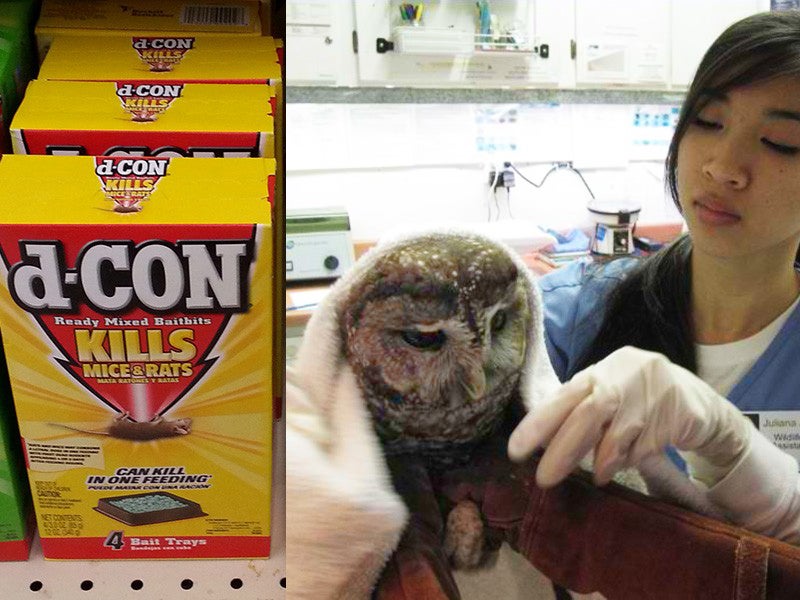d-CON Agrees to Pull Super-Toxic Rat Poisons From Stores
Victory
—Following years of pressure from conservation, public-health and animal-rights groups, the maker of the rat poison d-CON agreed today to stop producing its super-toxic rat poisons and pull the products from store shelves by early next year. Reckitt Benckiser, the parent company of d-CON, had been challenging a decision by the EPA to limit the…
Contact
Following years of pressure from conservation, public-health and animal-rights groups, the maker of the rat poison d-CON agreed today to stop producing its super-toxic rat poisons and pull the products from store shelves by early next year. Reckitt Benckiser, the parent company of d-CON, had been challenging a decision by the EPA to limit the sale of super-toxic rat poison to avoid unintentional poisonings of children, pets and wildlife.
“This is a significant victory for families, pets and wildlife,” said Jonathan Evans, toxics and endangered species campaign director at the Center for Biological Diversity. “While the fight isn’t over until all of these hazardous products are off the market, this decision keeps the worst of the worst products from residential consumers.”
Under today’s agreement with the Environmental Protection Agency d-CON will stop making super-toxic rat poisons by the end of 2014, which will be replaced on the shelves with safer products by March 2015. These super-toxic poisons—called second-generation anticoagulant rodenticides—will still be available for bulk sales to agricultural users and by licensed pest-control operators.
“We can celebrate today the fact that d-CON’s days are numbered,” said Greg Loarie, an attorney with Earthjustice. “These poisons have been putting our children at risk and devastating our wildlife for far too long. There are many safe alternatives for controlling pests without the accidently poisonings. ”
A range of environmental, public-health and animal-rights groups has been pushing the EPA for decades to enact common-sense controls on dangerous rodenticides. Earthjustice is representing wildlife advocates at the Center for Biological Diversity, Sierra Club, Defenders of Wildlife and the American Bird Conservancy in the EPA’s current cancellation proceeding with Reckitt Benckiser.
"Pesticide manufacturers must take responsibility for the impacts of their products." said Jason Rylander, Senior Attorney at Defenders of Wildlife. "Today's announcement to remove these hazardous rat poisons from the marketplace is long overdue and could save the lives of people, pets, and imperiled wildlife."
“American Bird Conservancy is pleased the d-CON company has finally accepted EPA’s scientifically-based decision to remove these poison products from retail shelves,” said Cynthia Palmer, pesticides program manager at the American Bird Conservancy. “This is a huge victory for eagles, owls, hawks and other wildlife, and for children and pets as well.”
“The lingering effects of these second-generation poisons have been wreaking havoc up the food chain for years, impacting endangered species such as the San Joaquin kit fox,” said Sarah Friedman, senior campaign representative at the Sierra Club. “Today's agreement is an important step toward protecting fragile wildlife species from unnecessarily toxic poisons.”
Safe alternatives to rat poison can be used to address rodent outbreaks in homes and rural areas. Effective measures include rodent-proofing of homes and farms by sealing cracks and crevices and eliminating food sources; providing owl boxes to encourage natural predation; and utilizing traps that don’t involve these highly toxic chemicals. For more information visit SafeRodentControl.org.
Background
Anticoagulant rodenticides interfere with blood clotting, resulting in uncontrollable bleeding that leads to death. Second-generation anticoagulants—including the compounds brodifacoum, bromadiolone, difethialone and difenacoum—are especially hazardous and persist for a long time in body tissues. These slow-acting poisons are often eaten for several days by rats and mice, causing the toxins to accumulate at many times the lethal dose in their tissues, poisoning predators that eat the weakened rodents.
Studies have documented second-generation anticoagulants in more than 70 percent of wildlife tested, including bald eagles, mountain lions, and endangered San Joaquin kit foxes. Over a 10-year period rodenticides caused, on average, more than 160 severe poisonings of pets annually. According to data from the EPA, each year up to 10,000 children are accidentally exposed to rat poison in their homes.

Additional Resources
About Earthjustice
Earthjustice is the premier nonprofit environmental law organization. We wield the power of law and the strength of partnership to protect people's health, to preserve magnificent places and wildlife, to advance clean energy, and to combat climate change. We are here because the earth needs a good lawyer.